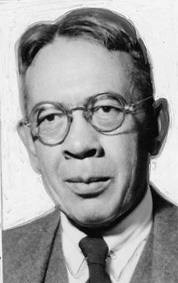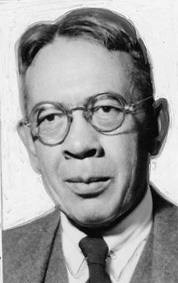His Life and Work
He was born Bernard Augustine DeVoto in Ogden, Utah. He attended the University of Utah for one year, then transferred to Harvard University, but interrupted his education to serve in World War I, graduating in 1920.
He began his career in 1922 as an English instructor at Northwestern University and began to write articles and novels, which often provoked controversy for their liberal viewpoint. Sometimes he used the pseudonyms "John August" and "Cady Hewes." In 1927, DeVoto resigned from Northwestern and moved to Massachusetts with his wife Avis . He began to dedicate himself to serious writing along with part-time instructing at Harvard University.(His ambition of attaining a permanent position at Harvard was never realized, however.) DeVoto wrote influential articles for periodicals, succeeding, for example, in promoting the Vilfredo Pareto vogue with a number of articles in Harper's Magazine in 1933.This led to a popular regular Harper's column, "The Easy Chair," which DeVoto wrote from 1935 until his death.
DeVoto became an authority on Mark Twain and served as a curator and editor for Twain's papers. From 1936 to 1938 he lived in New York City, where he was editor of the Saturday Review of Literature, after which he returned to Massachusetts.
In 1936, DeVoto published "Genius is Not Enough," a review of Thomas Wolfe's The Story of a Novel (1936), in which he wrote that Wolfe's work was "hacked and shaped and compressed into something resembling a novel by Mr. Perkins and the assembly-line at Scribners. The effect of this essay on Wolfe's self-confidence was perhaps the greatest influence on his cutting ties with Scribners and editor Maxwell Perkins shortly before his death in 1938.
In DeVoto's later years, he gained fame for his popular histories of the West: The Year of Decision: 1846 (1943), Across the Wide Missouri (1947), The Course of Empire (1952), and a popular abridged edition of The Journals of Lewis and Clark (1953). Across the Wide Missouri won the Pulitzer Prize for History and The Course of Empire won the National book Award for Nonfiction. From the 1940s to the end of his life, he was renowned for his championing of public lands and of conservation of natural resources, and for his pugnacious defense of civil liberties.
His wife Avis DeVoto was a book reviewer, editor, and avid cook. She became friends with Julia Child, the future author of cookbooks and host of television cooking demonstrations. Child had written a fan letter to Bernard DeVoto regarding an article of his in Harper's Magazine; he had said that he detested stainless steel knives, which she thought "100% right". Avis's response began a long correspondence and friendship between the two women during Child's work on her groundbreaking Mastering the Art of French Cooking (1961). Child acknowledged Avis as "wet nurse" and "mentor" to the undertaking. Their correspondence is held in the Schlesinger Library at the Radcliffe Institute, Harvard University, and selections appeared in the book, As Always, Julia (2010)
His and Avis' son Mark DeVoto is a music theorist, composer, and retired professor at Tufts University. Their eldest son, Gordon DeVoto, died in 2009
His Life and Work
He was born Bernard Augustine DeVoto in Ogden, Utah. He attended the University of Utah for one year, then transferred to Harvard University, but interrupted his education to serve in World War I, graduating in 1920.
He began his career in 1922 as an English instructor at Northwestern University and began to write articles and novels, which often provoked controversy for their liberal viewpoint. Sometimes he used the pseudonyms "John August" and "Cady Hewes." In 1927, DeVoto resigned from Northwestern and moved to Massachusetts with his wife Avis . He began to dedicate himself to serious writing along with part-time instructing at Harvard University.(His ambition of attaining a permanent position at Harvard was never realized, however.) DeVoto wrote influential articles for periodicals, succeeding, for example, in promoting the Vilfredo Pareto vogue with a number of articles in Harper's Magazine in 1933.This led to a popular regular Harper's column, "The Easy Chair," which DeVoto wrote from 1935 until his death.
DeVoto became an authority on Mark Twain and served as a curator and editor for Twain's papers. From 1936 to 1938 he lived in New York City, where he was editor of the Saturday Review of Literature, after which he returned to Massachusetts.
In 1936, DeVoto published "Genius is Not Enough," a review of Thomas Wolfe's The Story of a Novel (1936), in which he wrote that Wolfe's work was "hacked and shaped and compressed into something resembling a novel by Mr. Perkins and the assembly-line at Scribners. The effect of this essay on Wolfe's self-confidence was perhaps the greatest influence on his cutting ties with Scribners and editor Maxwell Perkins shortly before his death in 1938.
In DeVoto's later years, he gained fame for his popular histories of the West: The Year of Decision: 1846 (1943), Across the Wide Missouri (1947), The Course of Empire (1952), and a popular abridged edition of The Journals of Lewis and Clark (1953). Across the Wide Missouri won the Pulitzer Prize for History and The Course of Empire won the National book Award for Nonfiction. From the 1940s to the end of his life, he was renowned for his championing of public lands and of conservation of natural resources, and for his pugnacious defense of civil liberties.
His wife Avis DeVoto was a book reviewer, editor, and avid cook. She became friends with Julia Child, the future author of cookbooks and host of television cooking demonstrations. Child had written a fan letter to Bernard DeVoto regarding an article of his in Harper's Magazine; he had said that he detested stainless steel knives, which she thought "100% right". Avis's response began a long correspondence and friendship between the two women during Child's work on her groundbreaking Mastering the Art of French Cooking (1961). Child acknowledged Avis as "wet nurse" and "mentor" to the undertaking. Their correspondence is held in the Schlesinger Library at the Radcliffe Institute, Harvard University, and selections appeared in the book, As Always, Julia (2010)
His and Avis' son Mark DeVoto is a music theorist, composer, and retired professor at Tufts University. Their eldest son, Gordon DeVoto, died in 2009
Family Members
Sponsored by Ancestry
Advertisement
Advertisement









